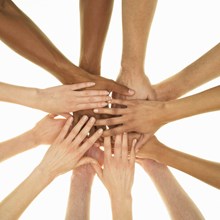Note: This article is excerpted from Free.
Would you consider selling or giving away half of what you own?
Since ancient times, truth seekers have divested of their possessions in order to go on a deeper search for meaning and union with God. Why? Perhaps because what we own, to some extent, owns us. Our stuff takes time and attention to maintain and occupies a place in our hearts.
Sometimes an experiment can shift our lives and thinking in a way that more modest or incremental steps never can. A few years ago, my small group tried to see how far we were willing to go to live out radical generosity. Inspired by the words of John the Baptist, "Anyone who has two shirts should share with the one who has none, and anyone who has food should do the same" (Luke 3:11), we decided to sell or give away half of our material possessions, donating the proceeds to global poverty relief.
Our goal wasn't to be exacting or legalistic, but to playfully engage each other to live more freely and generously. Each week over eight weeks, we would choose a category of possessions to sell, share, or give away. One week it would be clothes, another week books and music, and another week valuables and larger household items like cars and bicycles. As we sorted through our stuff, we often found an item that someone else in the group needed. We sold some items online, others at local resale shops, hosted a garage sale, and donated leftovers to a charity thrift store. It was shocking to find out how little some of our possessions were worth and disappointing that we'd regarded them as so precious. In the end, we collected thousands of dollars and sent a check off to a global relief organization.
We realized things about contentment that we never would have learned just by discussion. This experiment caused some of us to permanently change our buying and consumer habits. And we decided that it would be helpful to declutter, sell, share, and give away stuff once a year.
Your Turn
Consider doing this experiment with your small group. Over the next four weeks, go through your homes and take an inventory of what you own and discern what you are being invited to sell or give away over the next month. You can use the money you generate to (1) help people who are struggling with basic survival and health needs locally and globally, or (2) pay down your personal consumer debt. Here are some ideas on what to do with your stuff:
Sell. Some items can be sold online or at a resale shop, and the rest at a garage sale. Though it may seem tedious to try to sell some items, the process may help you see how you have overvalued your material possessions. Our friend Damon prized his large collection of books. He decided to post each book for sale online, even though on most books he would only make a dollar. The tedious work of wrapping up books and taking them to the post office helped him face his compulsion to continually buy books.
Share. You can cultivate a local economy of interdependence by sharing what you have with people you know. We've learned to ask around before buying items (especially tools or camping equipment) because there is a good chance that someone in our community has what someone else needs and will lend or gift it to them.
Give. If you can't sell the item and don't know anyone who needs it, take it to a thrift shop.
Recycle. Before throwing things in the trash, sending them to the landfill, find out what can be recycled. Many cities have programs for recycling items like batteries, old paint, electronic equipment, and even construction materials.
With a practice like this, it's helpful to keep in mind why you're doing it. Take a playful approach. It's voluntary and no one will be looking over your shoulder judging whether you've really gotten rid of exactly half of your stuff. See how far you're comfortable going, how much you're willing to risk, and what you might discover.
—Mark Scandrette. Taken from Free: Spending Your Time and Money on What Matters Most; copyright 2013 by Mark Scandrette. Used by permission of InterVarsity Press.









